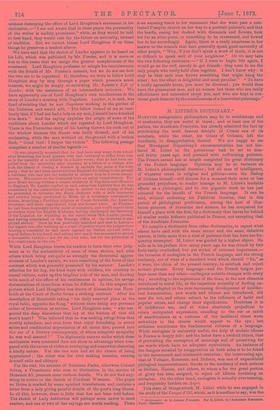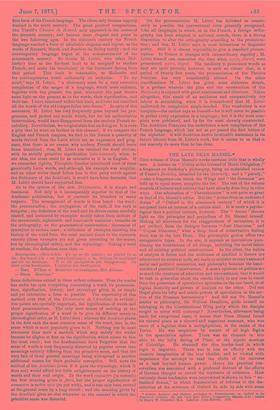M. LITTRE'S DICTIONARY.* HOWEVER antagonistic philosophers may be to archbishops
and to academies, they are useful at times ; and at least one of the parties, the Academie Francaise, has already admitted the fact by proclaiming the most famous disciple of Comte one of its members, while the other, his Grace of Orleans, left the Academie, in disapprobation thereof. We are happy to see that Monsignor Dupanloup's. excommunication has not hin- dered M. Littre in the portentous task he set to him- self thirty years ago, and pursued with unflinching patience. The French savant has at length completed his great dictionary of the French language. Opinions may be at variance on M. Littre's philosophical doctrine ; but all men of intelligence, of whatever creed in religion and politics—even the Bishop of Orleans himself—will dismiss for a moment their more or less grounded prejudices, to render homage to M. Littre's laudable efforts as a philologist, and to the gigantic work he has just achieved for the benefit of the French language. It can be said, without endorsing his Positivist theories, that in this period of philological proficiency, among the host of illus- trious pioneers of literature and science, he has conquered for himself a place with the first, by a dictionary that leaves far behind all similar works hitherto published in France, not excepting that of the Academie Franeaise.
To compile a dictionary from other dictionaries, to repeat what others have said with the same errors and the same defective system, is little more than a trial of patience that has been too fre- quently attempted. M. Littre was guided by a higher object. He tells us in his preface that many years ago he was struck by two facts easily overlooked, but yet withal of extreme importance,— the invasion of neologism in the French language, and the strong tendency, out of want of a standard work which should " fix," as it were, the idiom of the present century, to overlook and reject archaic phrases. Every language—and the French tongue per- haps more than any other—undergoes notable changes with every day ; according to the aspirations of the time, to the new elements introduced in social life, to the imperious necessity of finding ex- pressions adapted to the ever-increasing development of intellec- tual fermentation, new words and idioms are introduced, old ones die out, and others submit to the influence of habit and popular errors, and change their signification. Doubtless it is of indifferent use, and at times absolutely prejudicial to retain antiquated expressions, sounding to the ear as much of anachronisms as a costume of the mediaeval times worn nowadays in the streets would appear to the eye ; but archaism constitutes the fundamental richness of a language. While neologism is eminently useful, the help of archaic idioms in France is deeply felt ; and the latter have a twofold object, that of preventing the corruption of meanings and of preserving for use words which have no adequate equivalents. An instance of the dangers entailed by exaggeration on both sides is to be found in the seventeenth and nineteenth centuries ; the intervening age, that of Voltaire, Rousseau, and Diderot, was one of unparalleled philogical impoverishment, thanks to the tendency of such authors as Boileau, Racine, and others, to whom a far too great portion of glory has been assigned, to reject all idioms bordering on archaism. On the other hand, neologism is actually overweening, and frequently borders on Argot.
This state of things struck M. Lithe while he was engaged in the study of the Longue d' Oil, which, as it is needless to say, was the
• Dictionnaire de 1a Lanque Franfairse. Par E. Lilted, de lArackimie Prancaise. Paris : Hachette.
first form of the French language. The idiom only became vaguely distinct in the ninth century. The great poetical compositions, like Tarold's Chanson de Roland, only appeared in the course of the eleventh century, and became more elegant and purer in the two following ages. In the sixteenth century the French language reached a form of admirable elegance and vigour, as the works of Ronsard, Marot, and Joachim du Bellay testify ; and the contemporary language began at the commencement of the seventeenth century. So thinks M. Littre, who takes Mal- herbe's time as the furthest limit to be assigned to modern French, and seeks his vocabulary in the literature dating from that period. This limit is reasonable, as Malherbe and his contemporaries touch sufficiently on archaism. " To my mind," says M. Littre, " a dictionary must be a very extensive compilation of the usages of a language, which must embrace, together with the present, the past, whenever the past throws some light on the present as to the words, their signification, and their use. I have remained within this limit, and have not inscribed all the words of the old tongue fallen into disuse." In spite of this assurance, M. Littre has very frequently gone beyond his pro- gramme, and picked out words which, but for his authoritative intervention, would have disappeared from the modern French vo- cabulary. Nevertheless, we congratulate him on doing so. It is even
a pity that he went no farther in this channel ; if we compare the English and French tongues, we find in the former a quantity of
words derived from the Latin which are so expressive and preg- nant, that there is no reason why modern French should leave them unnoticed ; thus, M. Lithe has retained the word abstme, with its strictly primitive signification (abs-temetum), when, to our idea, the sense could be as extensive as it is in English. If we remember rightly, Theophile Gautier introduced most of these generically Latin words, and although his example was singular, and no other writer dared follow him in this petty revolt against the dictionary of the Academie, it would have been desirable that M. Littre should have supported him.
As to the system of the new Dictionnaire, it is simple and luminous. Not only is it incomparably superior to that of the Academic publication, but it corrects its blunders in many respects. The arrangement of words is thus based : the word ; the pronunciation ; the conjugation of the verb, if the verb is irregular ; the definition of the word and its divers senses carefully classed, and instanced by examples mostly taken from authors of the seventeenth, eighteenth, and nineteenth centuries ; remarks on the orthography, on the grammatical construction ; discussion of synonyms in certain cases ; a collection of examples showing the history of the word from the most ancient times to the sixteenth century (these examples are not given according to the senses, but by chronological order), and the etymology. Taking a word at random, the definition runs thus :—
Bounommi.—(Bou-ti-kie. L'r ne se lie jamais ; an pluriel l's se lie : des bou-ti-kie z en leurs boutiques.) s. m. Artisan ou marchand qui est on boutique. II Il se dit quelquefois par denigrement. Co n'est qu'un boutiquier. L'opinion des bontiquiers.
— HIST. XVIme s. Bonticlier on boutiquier, Rob. Etienne. —ETYM. Boutique."
Some definitions extend to three or four columns. Thus the reader has under his eyes everything concerning a word, its pronuncia- tion, signification, history, and etymology given in as simple and yet exhaustive a form as possible. The superiority of this method over that of the Dictionnaire de 'Academie is evident ;
two points are specially important, the signification of words And their pronunciation. The only sure means of arriving at the
proper signification of a word is to give its different senses in chronological order, as M. Littre does ; whereas the Academie places in the first rank the most common sense of the word, that is, the sense which is most popularly given to it. Nothing can be more erroneous than such a method, which may satisfy the reader because he alights at first on the signification which seems to him the most exact ; but the Academicians have forgotten that the sense of words is very frequently distorted by popular errors into meanings entirely differing from the primitive sense, and that the very fact of these general meanings being widespread is another additional reason for their probable corruption. Still more the method of the Acade'mie (even if it gave the etymology, which it does not) would afford but little enlightenment on the history of words and their real origin. In the word commettre (to commit) the first meaning given is faire, but the proper signification of commettre is mettre avec (to put with), and it can only have arrived at the general sense by a long circuit ; and the meaning given by the Academie gives no clue whatever to the manner in which the primitive sense was distorted.
On the pronunciation M. Littre has followed as consist- ently as possible the conventional rules generally recognised. Like all languages in which, as in the French, a foreign ortho- graphy has been adapted to national sounds, there is a strong disposition to alter the orthography according to the pronuncia- tion ; and this, M. Lithe says, is most deleterious to linguistic purity. Still it is almost impossible to give a standard pronun- ciation. In France it changes with extraordinary rapidity ; M. Littre himself can remember the time when secret, discret, were- pronounced segret, disgret. The tendency to pronounce words as. they are spelt prevails, however, to such an extent that, in a period of twenty-five years, the pronunciation of the Theatre Francais has very considerably altered. On the other classifications M. Lithe has given some elaborate details, in a preface wherein the plan and the construction of the Dictionary is exposed with great conciseness and clearness. Taken altogether, this result of an assiduous and comparatively dry labour is astonishing, when it is remembered that M. Littre undertook its completion single-handed. The vocabulary is not complete—the author says so himself—for it will never be possible- to gather every expression in a language ; but it is the most com- plete ever published, and by far the most cleverly constructed. The Academie Francaise has undertaken a new compilation of the- French language, which has not as yet passed the first letters of the alphabet ; it will doubtless derive invaluable assistance in its. future labours from M. Littre's work, but it seems to us that it• can scarcely do more than he has done.



































 Previous page
Previous page